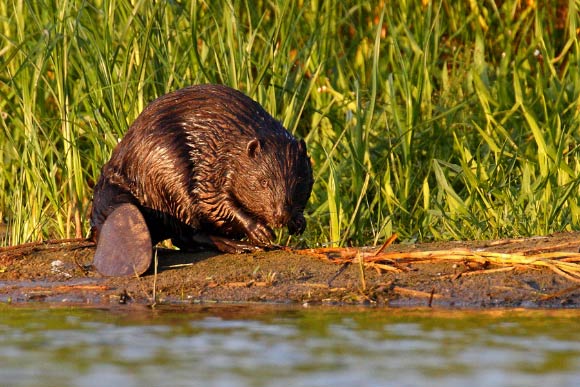
New Study Provides Insights into Genetic History of European Beaver – Sci
February 18, 2014Explainer: What and who are behind Ukraine’s political crisis?
February 19, 2014VILNIUS – The question – whether the EU is mature enough to have a common foreign policy – needs to be asked in the light of recent comments by Gernot Erler and, indeed, Sergei Lavrov.
Erler, who is a member of the Social Democratic Party in Germany and a senior advisor on Russia relations to Chancellor Angela Merkel, said in January that the EU should review its Eastern Partnership (EaP) policy for the sake of better relations with Moscow.
“We have to ensure there is no tension between the Eastern Partnership and the Russian Customs Union,” he noted.
The idea was repeated by Russian foreign minister Lavrov at a press conference on Tuesday (18 February), shortly before an eruption of violence in Kiev, which saw police kill several people and storm the protesters’ “Maidan” camp after a two month siege.
“We urge a frank discussion of the Eastern Partnership and energy dialogue, the cornerstone of Russia’s relations with the EU,” Lavrov said.
This kind of talk masks the gravity of events in Ukraine and the pressure which Russia is exerting not just here, but also in several other EaP states – Azerbaijan, Armenia, Belarus, Georgia, and Moldova.
Coming from Erler, a man of no little influence in Berlin, it also speaks volumes on why the EU is still failing to shape an effective foreign policy.
The element which unites the 28 member countries is shared values: human rights, rule of law, a free economy.
The kind of pragmatism which Erler advocates is an element of discord: each of the 28 countries in the Union has its own interests. If they all pursue realpolitik, there is no chance of a united front.
Pragmatism undermines the mutual trust between EU countries and the very foundations of the European Union.
If the EU follows Erler’s advice to postpone, or to sacrifice, its support for the democratisation of the EaP region, it is not only the EaP countries that will pay the price, but also our own unity.
Meanwhile, it must be understood that when Georgia and Moldova initialed EU association and free trade pacts last November, they were not making pragmatic or economic decisions, but civilizational ones.
The real issue at stake is not trade, but people’s right to self-determination.
These countries, and the opposition movement in Ukraine, want to get closer to the EU because they want to live in democratic and law-abiding societies – European societies.
The EU has no right to put their fate on its negotiating table with Russia.
Realpolitik aside, the prospect of an effective EU foreign policy is also endangered by other factors.
European politics is governed by a short-term electoral cycle, which creates a temptation for leaders to react to events in an ahistoric way.
When a new government is elected, we often hear calls to turn over a new leaf, or to reset relations, in this or that domain. But in reality, no important political project can be undertaken without due regard for its historical roots or completed in a single term in office.
International relations, and especially EU relations with Russia, require a lot of patience. All change is incremental.
People, like Erler, who say we should start afresh with Russia in light of the Ukraine crisis, merely show their feeble memory, or deliberate forgetfulness, and risk repeating the mistakes of the past.
I choose my words carefully when I say that his proposal to review the EaP is irresponsible.
It is a discourse which dates back to the Europe of 1938 and 1939. The EaP has problems not because it is badly designed or because people in EaP countries do not want it. It has problems because Russia is creating them and appeasement will only make matters worse.
The more difficulties that Russia makes, the more important it is for us to maintain our principled stance.
What we need vis-a-vis Russia is not fine talk, but adequate instruments to counter its aggressive behaviour.
And if we want to strengthen our foreign policy in the region, then, ironically, Lavrov’s remark shows us the way to go.
“We urge a frank discussion on the … energy dialogue,” he said.
The EU in 2009 put into law its “third energy package,” which forces EU companies and foreign firms active in the EU to separate energy production and distribution assets. It has a clear goal – to stop monopolitsic price gouging, not least by Russia’s energy champion, Gazprom.
It has caused friction at the highest levels in EU and Russia contacts.
But the EU has not backed down. If anything, it has gone further – in 2012 EU officials raided Gazprom offices in several European capitals and launched a legal case which could end in fines.
We should consider EU energy law as a model for EU-Russia relations more broadly.
The EU needs a foreign policy with a clear goal and with the legal instruments to implement it. But above all, it needs the political will to see it through, instead of making u-turns or concessions when Russia complains.
The writer is a Lithuanian MP and a former Lithuanian foreign minister

